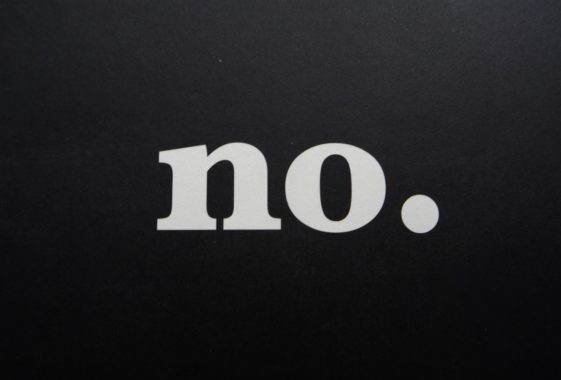Your New Year’s Resolution: Learn to Say ‘No’ and Stop People-Pleasing

At the end of 2018, one in five British people made a New Year’s Resolution (according to YouGov). However, resolutions are notoriously hard to keep, and many people ditch theirs by the time February rolls around.
One of the most fulfilling resolutions you can make at any time of year, but particularly heading into 2020, is to say ‘no’ more often. Say ‘yes’ to the things you want to do and can do, but stop getting stuck in the people-pleasing trap.
People-pleasing can feel addictive because you make others happy, and you often end up solving their problems, but it isn’t healthy, so that’s why you need to change your outlook.
Mental Health Risks of People-Pleasing
From a young age, we are taught that putting other people’s needs before our own is admirable. There’s nothing wrong with being empathetic, but constantly putting yourself last is actually very damaging. You may find yourself trapped in toxic relationships, burned out, or plain miserable.
People-pleasers typically have low self-esteem – much of your personal value will be measured in your relationships with others, and in the fear of being alone or rejected.
By being a ‘yes man’ or ‘yes woman’, you hope it will keep you in everyone’s good books, and you’ll feel rewarded. In contrast, you may struggle to ask for favours, help or commitment from others, afraid of being too demanding. This puts you at a disadvantage in your relationships and forces you to place little value on your own happiness.
When you say ‘yes’ to everything, you flood your calendar and to-do list and you make it impossible to prioritise. Any sense of order or priority is fleeting; it will only last until the next favour is asked, when everything is thrown into disarray to make room for it. Your physical health will also be compromised by such a packed schedule.
The Benefits of Saying No
By turning down commitments you know you’ll resent, dread or struggle with, you are empowering yourself. You will begin to build stronger and more equal relationships.
Downtime is just as important as busy or exciting times. Your mind and body need to rest, and this can’t happen if you’ve overcommitted yourself. Without downtime to compensate, you can’t perform at your best.
The temptation to say ‘yes’ can often be wrapped up in the expectation that you will get something back – for example, money, attention, affection, favours in turn, or loyalty. In practice, there’s no guarantee you will get anything back from the arrangement. Remind yourself that any promised advantages might never happen.
Friendships and relationships shouldn’t be based on favours and transactions. People should spend time with you because they like you, not because of what you can do for them.
How to Say No
- Start with low-risk scenarios – say no to that last drink in the pub, or to cleaning up your teenager’s kitchen mess at home. Don’t start with something huge.
- Practice in the mirror to boost your confidence. You can even have a ‘script’ if it helps. For example: “Thanks for the invitation to your hen party! I can’t make it, but I really hope you have fun.”
- When faced with someone who doesn’t like being turned down, you could give a specific reason whilst you’re getting used to being assertive. Equally you could answer: “I can’t go into the reasons why, as they’re quite complicated, but I definitely have to say no.” The more you practice saying ‘no’, and apply it in real life, the more you can move towards not needing a reason at all.
- Remember there are only 24 hours in a day, and most of those have to be spent working, sleeping, and managing basic tasks you couldn’t avoid even if you tried. The amount of time you have to yourself is precious, and you cannot claw time back from working or sleeping without serious consequences. You will never be able to do all the things you’d like to agree to, let alone the things you don’t want to do but feel obliged to take on.
- If you’re guilty of saying ‘yes’ in the moment, only to regret it later when you weigh up the effort or stress involved, take a step back. Tell the person asking that you cannot decide without checking a few things in your calendar first, and you will give them an answer later. However, if you already know the answer is no, why prolong it?
- Try to separate the person from their demand: saying you cannot do your friend a favour does not mean you are rejecting their friendship or trying to make life difficult for them.
- Be mindful that saying no will feel harder if the person you turn down is battling issues of their own. If they get upset or offended, they might be taking out external stresses on you. Their own mental health issues, such as Borderline Personality Disorder, may also add complications and make you feel guilty about saying no. This doesn’t mean you should reverse your decision.
Take these tips into 2020 and feel the power of saying ‘no’.
Written by guest contributor Vikram Das for Dr Chrissie Tizzard, Chartered Consultant Psychologist, PsychD, BSc, MSc, C.Psychol, C.Sci, AFBPS. Dr Tizzard is the Clinical Director of Christine Tizzard Psychology (ctpsy.co.uk).